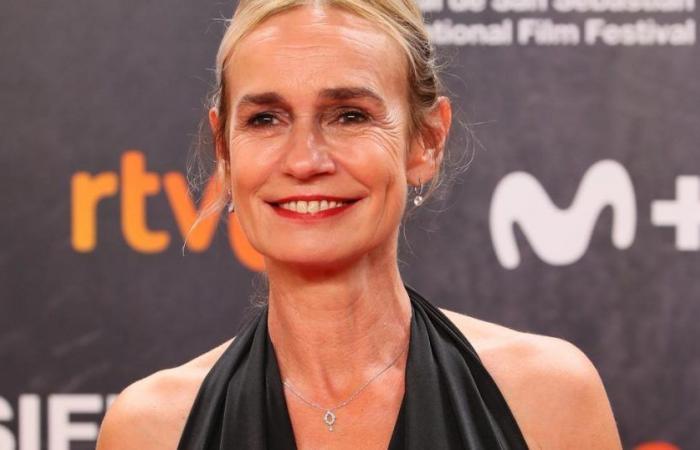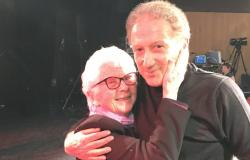Invited from June 25 to 30 by Julie Gayet to the Sœurs Jumelles festival in Rochefort, the actress-director carries out her projects – shows, films, documentaries – with intelligence and passion.
Inseparable in cinema, in video games, advertising, series, animation…, music and image are also in the personal and artistic life of Sandrine Bonnaire, who was ideally suited to participate in the Twin Sisters Festival dedicated to the unwavering bond between these two universal languages. Guest of the fourth edition which will be held from June 25 to 30, in Rochefort (Charente-Maritime), the actress and director will be the common thread of an artistic meeting where Emmanuelle Laborit and Erik Truffaz will speak (June 29); she will also present to the public her musical documentaries on Jacques Higelin (2015) and Marianne Faithfull (2018). A few days before the event created and chaired by Julie Gayet, she tells us about her musical passions, her projects as a director, and returns to the issues that agitate the cinema industry.
Read also“We are our age whatever we do”: Sandrine Bonnaire does not want to appear young at all costs
Madame Figaro. – What place does music hold in your life?
Sandrine Bonnaire. – Immense ! When I was little, I loved dancing. I did classic and modern, we imagined ourselves as Claudette with my sister, we invented choreographies to the song Funkytown, of Lipps Inc, whose movements we still happen to reproduce. As an adult, I also did a lot of oriental dance with my Algerian friends, and when I traveled, I signed up for classes: traditional dance in Indonesia, tango in Argentina, African dance… As a kid, I never dreamed of be an actress but a dancer or singer. My voice is, unfortunately, not up to par.
” data-script=”https://static.lefigaro.fr/widget-video/short-ttl/video/index.js” >
Yet you carry out musical shows with Erik Truffaz, your companion?
I don’t really sing there. Erik and I met on stage: he played, I said Duras. Since then, there have been The Clamor of the Fireflies and, currently, Together, in which I read Rimbaud and Patti Smith. We are also preparing an album: he composes, I write. I already have three texts: one about my autistic sister, which I am going to sing with my autistic friend and neighbor Charles Alazard, another about the attack I suffered; and I also hope to convince my friend Jacques Dutronc to do a duet on a title that I called Do nothing. Tailor-made.
Is music a tool for the actress?
She accompanies me to the dressing room to galvanize me, but above all she is my writing companion. However, I only listen to non-French or instrumental music so as not to interfere with my thoughts. For example, when I was working on Her name is Sabinethe documentary I made about my autistic sister, I listened to the piano, especially Chopin and the Prelude by Bach that Sabine plays in the film.
How important is the soundtrack to your films?
Huge. As Sabine moves in slow motion, I imagined, for example, a sound ambiance in keeping with her rhythm. During editing, we used the theme of Personal diary, by Nanni Moretti, as sample music, and I was so infatuated with it that I could no longer imagine anything else. I was lucky that the composer, Nicola Piovani, gave me the rights for free and allowed me to slow down his score. As for I’m angry at his absencemy first fiction film, I used a lot of additional music by composers Arvo Pärt and Henryk Górecki.
As a kid, I didn’t dream of being an actress but a dancer or singer
Sandrine Bonnaire
What emotions does music give you that cinema doesn’t give you?
She gives me all the freedoms, disinhibits me. On musical projects, I don’t have stage fright, because I’m not expected there. When I sang on stage with Jacques Higelin, I simply threw myself into the arena, without thinking. I didn’t have time anyway, because I was filming a documentary about him at the same time.
Are you shyer on a movie set?
More and more. As I am known, I have the impression that people will judge me more harshly, that people will say to themselves “I thought Bonnaire was better than that…”. No doubt I’m paranoid, but in this place, notoriety is a barrier for me. However, I put up with it, because it also offers me a platform: thanks to it, I have been heard on autism, violence against women or the mistreatment of seniors, since I recently filed a complaint against the nursing home where my mother died. Fame also allows me to carry out projects.
Did you become a director out of necessity?
In a way. Realizing was first of all the way to account for the dysfunction in the care of autism, which no one was talking about. I also had personal motivations: my mother was very protective of my sister Sabine, sometimes embarrassed by some of her behavior. With my images, I wanted to show her what she was capable of when you trusted her.
On musical projects, I don’t have stage fright, because I’m not expected there
Sandrine Bonnaire
Do you have any other directing projects?
I am going to make a fiction film about Slow Joe, an Indian singer-poet who, like the bluesman John Lee Hooker, wrote instinctively about the difficulty of life, the street… Guitarist Cédric de La Chapelle has it discovered in India, brought back to France, and recorded three albums with him. I also wrote four episodes of a series on Valérie Hervo, the founder of the libertine club Les Chandelles. She was a victim of incest, was under the influence of a man for years, suffered after failed cosmetic surgeries… But, by creating this club where women were considered and respected, she ended up repairing herself and reclaim your body. My daughter would play the young character, and I would play the one in the second half of life. I am still looking for partners, but I am keen on this project which, at a time of freedom of speech, is an edifying testimony to what women sometimes inflict on themselves to respond to injunctions.
Injunctions that actresses undergo. Does the passage of time worry you?
Women claim that they want to free themselves and, paradoxically, refuse to age. By not accepting our age, by freezing our image, we in a certain way endorse the object status to which we are assigned. Doing little things to look good, I understand that, but I find the shift into transformation pathetic and counterproductive.
What about the scarcity of roles?
It’s the same subject for me: you have to agree to play characters your own age so that people’s perspectives change profoundly. Especially since today there are relevant points of view which show that life does not end after 50 years. When I’m asked to play a grandmother, I don’t flinch, as long as it’s not just a grandmother who makes pancakes and walks with a cane. In the series The Fighters, I even played the mother of Grégoire Colin, an actor who is seven years younger than me. I played it on attitude, without any artifice of aging, and I am proud of having made it credible.
Realizing was the way to account for the dysfunction in the care of autism, which no one was talking about
Sandrine Bonnaire
The Twin Sisters Festival is committed to the fight against sexual and gender-based violence. Are you optimistic about how this fight is going?
Yes, because from now on everyone will have to hold their own on a set, and that’s so much the better. However, we must not sow fear. The fight to be waged is against the aggressors, not against men. It also seems essential to me to distinguish between rape, an abuse of power and a heavy guy. Sanctions must be proportional and adapted on a case-by-case basis. The spectrum of aggression and abuse is vast, and it should not be mixed up.
Twin Sisters Festival, June 25 to 30, in Rochefort.
sistersjumelles.com






